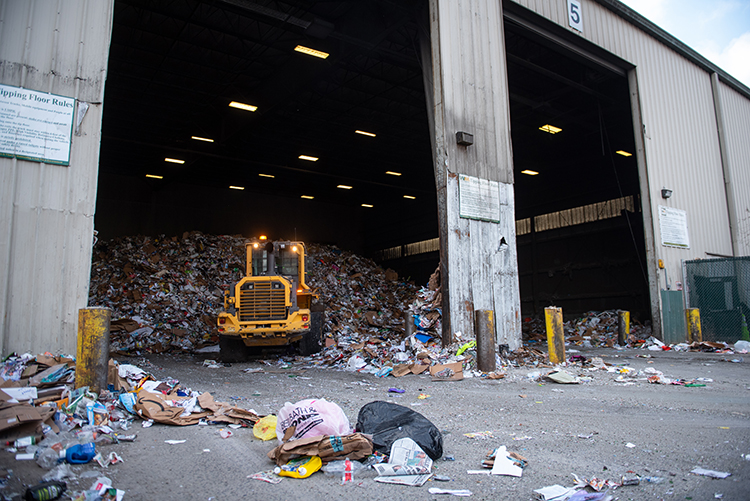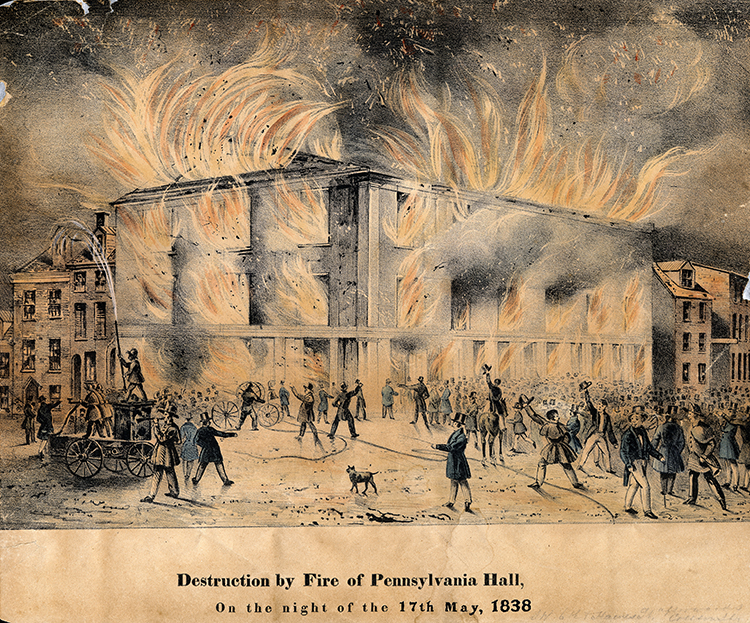Philadelphia’s understaffed Recycling Department was unprepared for a shifting global market. As a result, Philadelphia now burns 50 percent of its recyclables.
by Samantha Wittchen
When America Recycles Day was celebrated on November 15, the Philadelphia Streets Department held a pop-up event, complete with recycling quizzes, games and prizes, in the basement of the Municipal Services Building. But here are some trivia questions that were undoubtedly not being asked:
Q: How much recycling collected in Philadelphia is actually recycled, and how much is incinerated?
A: About 50 percent is recycled and 50 percent incinerated.
Q: Who has served as the city’s recycling director for the past two years?
A: No one. The position was vacated over two years ago, and while there was an interim recycling coordinator, the director position was just filled in December.
It’s a stark contrast from what you might expect from a city that was recently trying to position itself as the greenest in the country. But longtime recycling advocates maintain that this pattern has replayed itself for years. The city sets lofty goals for managing its waste sustainably, while its actions say something different about how committed it is to fundamentals like recycling.
How did this current recycling crisis occur? The Streets Department contends it was brought on by a highly unfavorable economic climate wrought by China’s move to stop the import of recyclable materials from the United States. In an email, Streets Department Commissioner Carlton Williams says that “the current state of recycling is a global issue related to challenges across the global economy.”
Yet this tough recycling economy is just the latest in a string of downturns that have happened over the last few decades. “There have been about a half-dozen downturns since 1990,” says Chaz Miller, a 40-year recycling industry veteran and former director of the National Waste and Recycling Association.
In essence, a tight commodities market for recyclables is nothing new. Philadelphia has survived tough times in the past without resorting to burning half of its recyclables, a practice that, according to a letter sent to Mayor Jim Kenney on November 16 from State Senator John Sabatina, is in violation of state recycling law. What’s different this time?
Amid this downturn, Philly’s recycling contract expired, leaving it with no rate guarantees. The price the city had bargained with recycling vendor Republic Services was $16 per ton, but when the contract expired in September, the new interim rate offered was $170 per ton, over a 1,000 percent increase. The city enlisted Waste Management to take half of its recyclables—all they had capacity for—at $78 per ton, still almost five times what the city had been paying.
Knowing the contract was set to expire when the outlook for recycling markets was grim, the city could have started the process for awarding a new contract well before the old one expired. It didn’t, and critics argue that it just wasn’t a priority for the Streets Department.
“The request for proposals didn’t go out because the city delays on everything. They just don’t have the bandwidth to handle it,” says Maurice Sampson, the director of Clean Water Action for Eastern Pennsylvania, alluding to the fact that, at the time, the Streets Department had only an interim recycling coordinator but no recycling director or other senior-level staff. From 1985 to 1987, Sampson was Philadelphia’s first recycling coordinator.
The city argues that the reason for the delay was that it was (and is) seeking a longer-term contract than its previous one, which was structured for one year and could be renewed for three subsequent years on an annual basis. The city says that it’s struggling to secure a longer-term contract at a favorable rate.
Yet the recycling industry sources Grid talked to say that recycling processors are eager for the guaranteed business that comes with longer contracts, even if the markets are fluctuating, especially if they need to make investments in facilities or equipment to accommodate the materials they receive.
In addition to lackluster recycling markets, the city blames contamination for its difficulties in securing a longer-term contract with acceptable rates. Contamination is the recycling industry’s term for unclean or non-recyclable materials in the recycling stream. The higher the contamination rate, the more processors must charge to process materials to an acceptable quality for the markets.
According to a recent study of the city’s residential waste that was commissioned by the Streets Department, Philadelphia’s contamination rate was 19.2 percent in 2017, in line with a national average that gets placed between the low teens and 25 percent. “Curbside recycling has gotten very good with quantity but not with quality,” observes Miller.
Contamination may play a role in finding a processor, but some say not in the way that city officials claim. “The materials have been filthy for years,” contends Sampson, and the same recent residential waste study shows that Philadelphia’s 2010 contamination rate was 14.6 percent. Contamination isn’t a new problem. What’s more likely is that contamination is finally catching up with the city.
Because China accepted huge quantities of materials, regardless of their quality, it artificially bolstered recycling market prices. As a result, the city had no economic impetus to fix contamination, and it didn’t plan for a day when the markets might change. Miller indicates that this bullish outlook is naïve. “If you’re a private-sector scrap dealer, you know you’ll be losing money one out of every four years,” he observes. “So you plan for rainy days.”
He says that cities need to do the same. “Cities and their private-sector partners should set aside rainy-day funds. It’s commonplace in private recycling companies. If cities are going to be successful with their recycling programs, they need to start adopting some of these [practices].”
To solve the contamination issue, city officials say that residents must play a big role. According to Commissioner Williams, “The Streets Department is developing education and outreach programs to encourage residents to recycle correctly.”
To make meaningful change, though, Miller says that cities need to engage citizen input on those programs, something that Sampson says Philly fails to do. “Instead of asking for input, the Streets Departments presents what it wants to do and takes that presentation as endorsement,” he argues.
Even if the city mounts a successful education campaign to curb contamination, Miller says it may not be enough. “You’ll never totally clean this stuff up. People are people, and people are imperfect. Even the best-educated people can sometimes be confused.” Pinning all your hopes on better resident behavior may be a losing proposition.
Michael Brady of Real Recycling Philly, a grassroots coalition pushing for a comprehensive recycling plan for the city, believes that the city’s emphasis on a resident-only solution is wrong. “Since we’ve been raising the issue [of recyclables b
eing burned] and asking people to write their council member, the Streets director’s response has been to write an op-ed [Philadelphia Inquirer, November 12, 2018] telling people to do a better job of cleaning their recyclables. I understand what he’s trying to do, but it seems to us his priorities are misplaced.”
To make matters worse, the Streets Department’s own operations may also play a role in those contamination rates. Residents throughout the city, like Cat McManus of Fairmount, have reported collection crews combining trash with recycling. “When I asked the workers, they replied that our trash…was generally ‘clean’…so they could commingle recycling with trash,” says McManus.
Williams says that the Streets Department “prohibits this type of behavior and does take disciplinary action when verified” and encourages residents to report this behavior to 311. But when Meenal Lele of South Kensington reported to the city the practice of garbage and recycling being collected together, it fell on deaf ears, despite the fact that she had video evidence. “I reported it to 311 repeatedly for weeks, and they just kept marking it resolved even though it wasn’t,” says Lele. “I eventually called my councilwoman’s office, and they were kind but said there was nothing they could do because the Streets Department wouldn’t return their calls.”
She eventually reached Nic Esposito, Philadelphia’s Zero Waste and Litter director. He was sympathetic to her pleas, Lele says, but didn’t solve her problem, either. “What finally appeared to solve the problem was getting a bigger blue bin from Home Depot,” Lele explains.
The two major recycling players in Philadelphia, Waste Management and Republic Services, may be hesitant to enter into a longer-term contract with the city, knowing that the city’s materials have high contamination rates when compared with private customers, and that the Streets Department has no real plan aside from a nebulous, to-be-seen education program to address the issue.
Planning, some say, is not the city’s strong suit. “The Streets Department has no capacity for planning whatsoever,” explains Sampson. “We are the only major city in the country that does not have planning as part of our recycling department.”
Its planning problem is exacerbated by a Recycling Office starved for staff. This has been an issue ever since the Streets Department took over the Recycling Office in the late ’90s under then-mayor Ed Rendell. The office lost 80 percent of its senior staff and has never really recovered. At times during the last decade, there have been just one or two people focused on recycling for a city of 1.5 million people.
For comparison, the City of San Antonio, whose population is comparable to Philly’s, boasts a recycling staff of twenty-two people that perform planning, outreach, and customer service functions similar to Philadelphia’s Recycling Office.
When asked about the meager number of people devoted to recycling, Williams says, “[O]ur Recycling Office is supported greatly by other units within the Sanitation Division to aid in the development of policies, programs and implementation of plans…[I]t has been the Department’s experience that integrating…various units within the Sanitation Division is a more efficient management approach and allows for a wider range [of] personnel with different areas of expertise to work together in a team environment.”
While the Recycling Office may have access to these resources, it is also competing with the department’s other demands on these unit’s time. It’s not the same as having a dedicated recycling team. But not only has the city had few people within the Recycling Office, it has had prolonged lapses in leadership, which draws into question the ability to effectively plan and carry out recycling initiatives and respond to issues that arise, such as impending contract expirations. “We have repeatedly gone years between recycling directors,” says Sampson. “This is a pattern.”
The most recent lapse was from March 2016 to December 2018, but there have been other lapses in the past couple decades. Philadelphia’s new Recycling Director, Kyle Lewis, is an internal hire who most recently worked in the Office of the City Representative, the special events arm of city government, and has little direct experience in the waste and recycling industries.
Ultimately, city departments operate at the pleasure of the mayor, and the Streets Department has no imperative from the mayor to do anything differently from the way it’s been operating for decades.
“I don’t believe anyone in the system is acting with bad intentions,” argues Sampson. “Ultimately, this is the responsibility of the mayor. Until he is willing to say, ‘This is what I want, and I’m going to back that,’ nothing is going to happen.”
Even under the mayoral administration of good-government champion Michael Nutter, who brought single-stream recycling to Philadelphia, there was no substantive change in the leadership or structure of the Streets Department. Under Nutter, Clarena Tolson, a holdover from the recycling-hostile John Street administration, kept her job as Streets Commissioner, and the Recycling Office remained understaffed.
Brady says that the solution to Philly’s recycling problem will require the efforts of multiple branches of city government. “We’re not trying to put any city agency on the defensive, we just believe there is a better way for Philadelphia to recycle,” explains Brady. “If the mayor, the council and the Streets Department embrace the idea that we can do better and put the time and resources behind a comprehensive plan, I think they’ll have strong support.”
Time will tell if Mayor Kenney has the political will to mandate that the Streets Department make the necessary changes to fully empower Philadelphia’s Recycling Office to achieve his vision of zero waste. “If they want this to change, the pressure point is the mayor,” says Sampson. “It is the mayor that has to deliver.” In the meantime, the city has no specific timeline for when it will stop burning half of its recyclables, and it looks like it may be business, and government, as usual.









This is disgusting, especially since they were fining residents $50 a pop for not recycling properly and they have this whole Philacycle thing to turn around burn the recyclables… despicable.
Only in Phila. That is one of the filthiest major cities in America. This us a disgrace, I have always supported the recycling program. I wash all containers that I put in recycle. We must do better. Hire the people you need to get the job done.
We are going to need more than political will if we are going to solve the problem of the City making a product (recyclables) that no one wants to buy. I’m not sure it is fair for 1.5 million people to throw their hands in the air and absolve themselves from personal responsibility and fob it off on the Mayor. Nor is that a realisticway to move forward.
What does the 50% consist of? I’m assuming glass, aluminum, and steel aren’t being burned: is there a breakdown of the paper/plastic ratio? We try to keep our waste to a minimum, but is there something better to do with the waste plastic we have (aside from hoarding) than having it burnt?
I’ve start a business just to handle this problem. GreenAbility give businesses the ability to Green. We come daily and sort through that waste dumpster and sort out what can be recycled and recycle it for the business. My biggest problem is finding places to send my recyclable materials at the end of the week/month! But philly needs to get better with recycling! Granted we put out a lot of recyclable materials through the city recycling program but someone has to take it a step further!!!